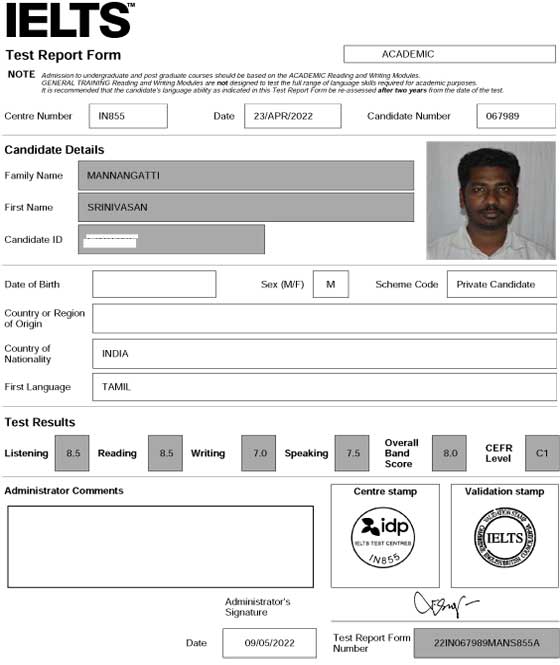Srinivasan got rid of his problems and scored Band 8 in IELTS, here is how
Srinivasan got an Overall Band 8 in IELTS, so when he wrote to us and said he’d like to share some preparation advice, we knew it would be of great value to every single test taker reading this blog. As a winner of our IELTS Results Competition, Srinivasan wanted to give back and help others overcome the IELTS challenge. Here are his suggestions to you, based on his own way of preparing for IELTS:
Srinivasan said, “First and foremost, get to know the test pattern and types of questions. Once you are familiar with that, learn the skills and use strategies suitable for every question type. Be realistic in your preparation, do not rush to sit the test before you are truly ready.
Listening
- Learn the question types and strategies for each type of question.
- Take a mock test and record the score.
- Review the test paper and note down your weak areas.
- Turn your weaknesses into your strengths.
Reading
Reading is hard for many people as they don’t have a habit of reading.
- Try to read newspapers and short texts as a habit.
- Part 3 of the Reading test is often filled with difficult questions, so reserve more time for it while leaving less time for Part 1 and Part 2.
- Identify where most mistakes are coming from – that is the area you need to focus on more.
- Review every test paper after completion to learn from your mistakes.
Writing
Writing test is the one where many students get a low band score, and it happened to me as well. It is important to understand what is needed to get a higher band with the help of band descriptors.
- In my first attempt I didn’t have anyone to guide me. In the next attempt, I found it is vital to get assistance from an IELTS expert.
- Learn all the types of questions and how to approach them.
- Practice in writing responses to the questions under timed conditions.
- Write down your mistakes and revise them before you start writing.
- Practice writing error-free sentences and using complex sentences in your essays.
- Planning is key to success in Writing Tasks 1 and 2.
- Read Band 9 essay samples to gain ideas and improve your style of writing.
Speaking
Speaking with confidence is very important to success.
- Read on a range of topics such as the environment, science, arts, schools, hometown, social media, etc (or watch films/videos on these topics). This will expand your vocabulary.
- Practicing speaking with a partner is highly recommended.
- In the Speaking test, Parts 2 and 3 are more important and require more preparation time.
- I recorded my speaking test and listened to it for mistakes, it is a good way to improve.
- Make sure you get an IELTS tutor to assess your speaking test and provide further guidance.
Congratulations to Srinivasan Mannangatti on achieving an Overall IELTS Band score of 8.0!


